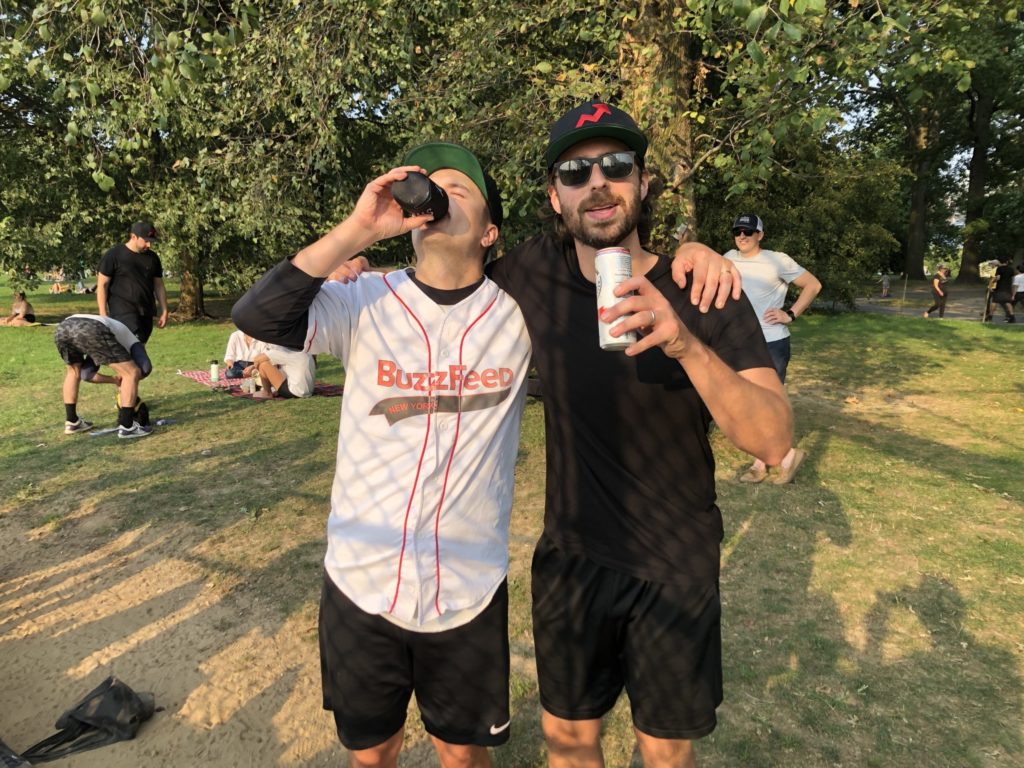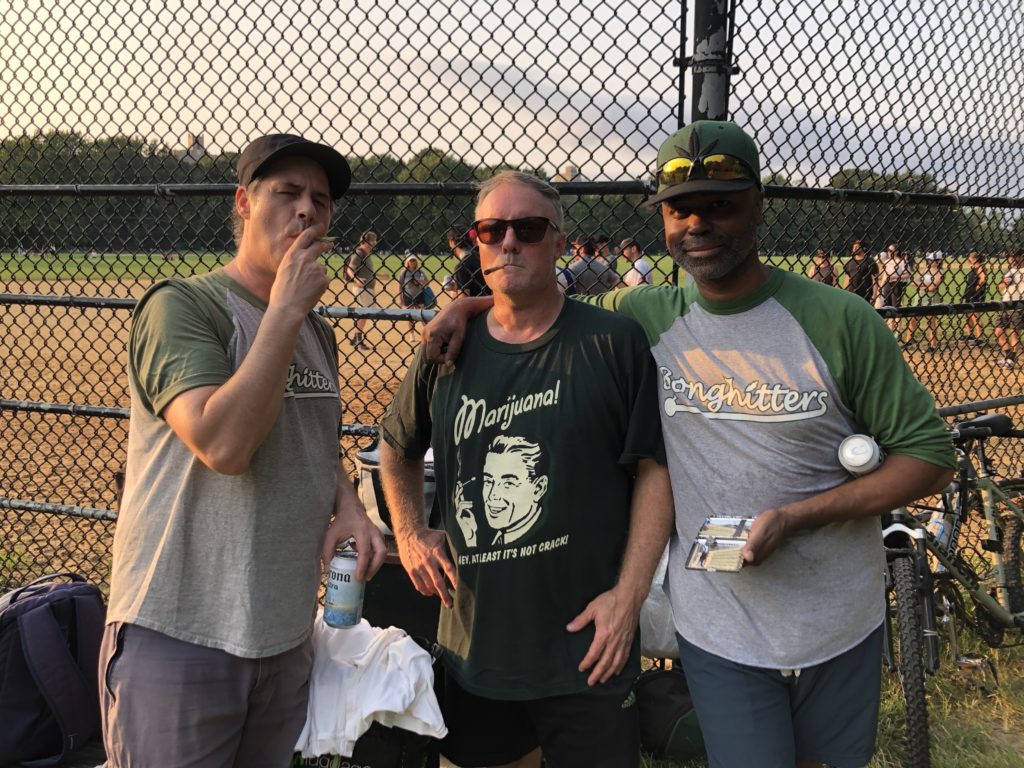The Media May Change but the Softball Stays the Same
Buzzfeed successfully defends championship
In what passes for a return to normalcy in an utterly abnormal year, last Sunday in Central Park BuzzFeed won the first New York Media Softball League championship, beating its arch-nemesis High Times 4-1. Capping off the first season after last year’s pandemic-induced hiatus, the team ran onto the field, spraying Miller Lite in all directions and hugging each other. BuzzFeed’s captain Matt “Skip” Kiebus leaned down to paste a sticker, which read “BuzzFeed 2021 champions,” printed in anticipation of the result, onto the league’s trophy.

High Times’s morale had crumbled after BuzzFeed’s Hank Van Zant, a former Division III baseball player, scored a home run, which the team followed up in the next inning with a miraculous catch where three players ran for it at the same time in right field. “When shit like that happens,” High Times team co-manager Mike Safir said after that play, “you know it might not be your day.”
In the good old days of media softball, teams from The New York Times, the New York Post, Daily News, and the Associated Press would face off in Central Park. Players came out from all over. Bill Scheft, who ended up head writer on the Late Show with David Letterman, played for the AP, baseball writer Murray Chass pitched for the AP and then The Times, and The New Yorker’s Roger Angell would throw the occasional first pitch.
But even before the pandemic put the league on hiatus, the shake-ups in the media landscape were apparent on the ballfield. In 2017 High Times, whose softball squad the Bonghitters have been a longtime league powerhouse, announced the company was pulling out of New York for Los Angeles’s 420-friendlier pastures, leaving behind its editorial roots as the company looked to branch out into dispensaries and events. “At this point, there’s no one on the team that works directly for the magazine anymore,” said Damion Da Costa, co-manager and 22-year veteran of the team. “We’ve got a stockholder, but we’re more representative now than actually sponsored by them.” (Safir, the sometime stockholder, said he divested earlier this year.)
Just as the hoary stoner mag was losing its focus on print publishing, the Bonghitters found themselves having to adapt to newcomers in the media scene as viral content specialists BuzzFeed joined the league in 2017. While the Bonghitters were known in their ’90s heyday for their “om” circles, bongos, and playing a near-perfect game on shrooms, the BuzzFeed team walks into every game with a Bluetooth speaker pumping out a playlist featuring Limp Bizkit and Nickelback. “I think it really gets into what the team is all about,” said Dave Stopera, a founding editor at BuzzFeed, who’s been with them since before they joined the league.
The other teams that made the playoffs, Forbes and Chartbeat, were considered long shots. League commissioner Steve Bloom, a former editor at High Times, said Chartbeat “were only 4-7, so they shouldn’t really be in the playoffs, but lucky for them that the other three teams are worse.” Forbes, led on the field by chief content officer and editor Randall Lane and longtime pitcher Stephanie Mazzamaro, who left the company in 2016, are a playoffs regular which has never won the championship. They made it this year despite suffering the most spectacular injury of the season. After rookie Max Binder, a marketing data manager, dislocated his shoulder diving for a ball, teammates rushed him to the ER. Binder was back in time for post-game drinks, but, in late August, he was still waiting for an operation to fix his shoulder’s labrum. It was “100 percent” worth it.”
To everyone’s surprise, The Wall Street Journal, which holds the most championship wins in league history, failed to make the playoffs. “We had a bunch of people leave the company; we’ve had people who left the New York area during the pandemic and hadn’t returned,” said team captain Jared Diamond, “so a good chunk of our regular lineup wasn’t around this year.” Even Diamond went on leave in April, after the birth of his twins, but he couldn’t resist softball’s return. He went on a furious recruiting spree and ended up with more new players than he could comfortably field. “No one did anything for a year in 2020,” Diamond said, “so when presented with the opportunity to go run around and play outside, everybody wanted to take part.”
The New York Public Radio team ran a similarly aggressive recruitment drive and found that it helped address the gender imbalance on their team, which seems to be a persistent problem for teams in the nominally co-ed league. “One game, we had seven women turn up to play, and we worked them ALL into the rotation at-bat and on the field,” wrote co-captain Caryn Havlik in an email, “and that’s saying something in co-ed softball, where female players are sometimes hard to recruit and keep on a team. It is a little-known fact that sometimes softball can be unwelcoming to women.”
High Times leaving the city hasn’t stopped the Bonghitters from playing hard under the old colors. They won the 2017 championship and repeated the victory in 2018 after BuzzFeed forfeited because much of the team had to attend a player’s wedding on the rain date for the final, and Stopera couldn’t miss a Paul Simon concert. BuzzFeed finally won their first championship in 2019. “We were talking a lot of shit,” Stopera said, “so it was very, very exciting to back it up.”
This year, BuzzFeed felt the added pressure and excitement that’s inescapable for defending champs. “Our Google invite is called Defend the Crown,” Stopera said. They lived up to the raised expectations, losing only one game all season. Though they came back from a tough start to win their first game against High Times, an 8-7 squeaker on July 27 in East River Park, High Times took the second, 7-6, on August 16th on Central Park’s Great Lawn.
Both teams admit to juicing. “You always gotta crack at least one beer before the first pitch and get that down,” Stopera said. “The only game we lost this year, we forgot to bring beer.” The Bonghitters are generous with their juice. In regular years, they’ll invite competitors over for post-game tokes. This year, following COVID protocols, they handed out joints instead. Da Costa said his team no longer smokes mid-play. “We used to have the rally joint,” he recalls, “but as we’ve gotten older, we don’t really do that during the game.”

